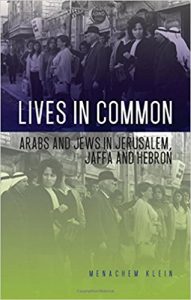Lives in Common
Arabs and Jews in Jerusalem, Jaffa and Hebron
Reviewed by Ian Black, The Guardian, 20 March 2015 (Hurst , 2014)
“Binyamin “Bibi” Netanyahu’s crushing victory in Israel’s general election has re-directed attention to the issues at the heart of the Middle East’s oldest conflict: the prospects for an independent Palestinian state and the broader question of the unequal relations between Jews and Arabs in the Holy Land. Anyone pondering the bleak meaning of Netanyahu’s shifting and highly-qualified pledges, and his dog-whistle polling-day warning that the country’s Arab citizens were coming out to vote “in vast numbers” should look at an important book that throws new light on a familiar story.”
“Menachem Klein’s Lives in Common looks at Arab-Jewish relations before and after 1948 – the year of Israel’s independence and the Palestinian Nakba. The familiar staples of politics, diplomacy and war cannot be avoided but here, unusually, momentous events form the backdrop, allowing ordinary people to take centre stage in Jerusalem, Hebron and Jaffa over the 130 years or so since Zionist settlement began. The first two cities were (and are) holy to Muslims and Jews alike, while Jaffa, now a stunted, gentrified appendage to Tel Aviv, was the commercial and cultural capital of Arab Palestine.
“By the final decades of Ottoman rule in the late 19th century all had substantial populations of native-born Arabic-speaking Jews. For them the East European Zionist immigrants who arrived en masse under the British mandate were far less familiar than the Muslims and Christians who then made up the vast majority of the population. Klein’s story is written more from the streets, shared courtyards and markets than from the archives of politicians and bureaucrats. It draws on autobiographies, diaries and the Hebrew and Arabic press to recreate a lost world where two communities lived alongside each other, cooperated in shared institutions and respected each others’ religious traditions.”…
“Klein not surprisingly identifies 1948 as marking the death of any shared non-sectarian Palestinian identity, and painstakingly catalogues the ways Israel’s conquest of the rump of Arab Palestine in the 1967 war paved the way for determined and continuing Jewish dominance. The takeover of Arab parts of Jerusalem today echoes what happened when Jewish settlers first moved back to Hebron in the 1970s – exercising a “right of return” that is still denied to Palestinians. Right-wing, religious Jewish nationalists are targeting the remaining Arab areas of Jaffa. Co-existence is not entirely dead but it is in very short supply: Netanyahu’s racist warning about Arab voters underlined the point dramatically.” (more…)

